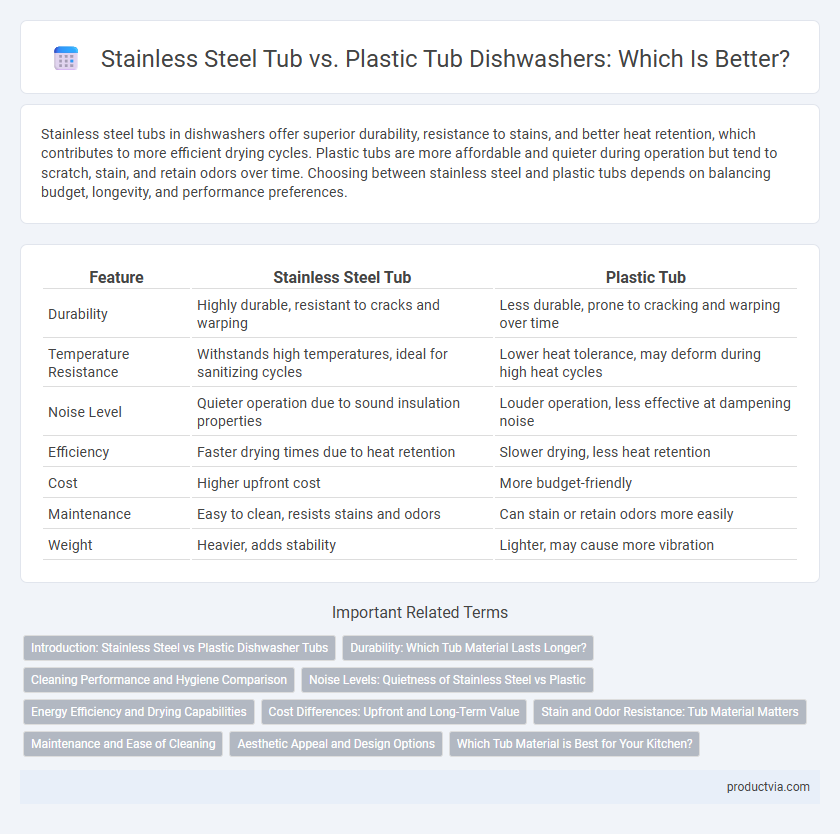Stainless steel tubs in dishwashers offer superior durability, resistance to stains, and better heat retention, which contributes to more efficient drying cycles. Plastic tubs are more affordable and quieter during operation but tend to scratch, stain, and retain odors over time. Choosing between stainless steel and plastic tubs depends on balancing budget, longevity, and performance preferences.
Table of Comparison
| Feature | Stainless Steel Tub | Plastic Tub |
|---|---|---|
| Durability | Highly durable, resistant to cracks and warping | Less durable, prone to cracking and warping over time |
| Temperature Resistance | Withstands high temperatures, ideal for sanitizing cycles | Lower heat tolerance, may deform during high heat cycles |
| Noise Level | Quieter operation due to sound insulation properties | Louder operation, less effective at dampening noise |
| Efficiency | Faster drying times due to heat retention | Slower drying, less heat retention |
| Cost | Higher upfront cost | More budget-friendly |
| Maintenance | Easy to clean, resists stains and odors | Can stain or retain odors more easily |
| Weight | Heavier, adds stability | Lighter, may cause more vibration |
Introduction: Stainless Steel vs Plastic Dishwasher Tubs
Stainless steel dishwasher tubs offer superior durability, resisting dents, stains, and odors compared to plastic tubs, which can warp or crack over time. These metal tubs also provide better heat retention, enhancing drying performance and energy efficiency. Plastic tubs are often quieter and more affordable but lack the longevity and high-end finish of stainless steel models.
Durability: Which Tub Material Lasts Longer?
Stainless steel tubs in dishwashers offer superior durability, resisting chipping, cracking, and staining over time compared to plastic tubs. Plastic tubs are more prone to wear from high temperatures and detergent chemicals, leading to faster degradation and possible odors. For long-term use, stainless steel tubs maintain structural integrity and performance, ensuring a longer lifespan in commercial and residential dishwashers.
Cleaning Performance and Hygiene Comparison
Stainless steel tubs in dishwashers offer superior cleaning performance due to better heat retention and resistance to staining, which enhances drying efficiency and reduces residue buildup. Plastic tubs, while more affordable, are prone to retaining odors and are less effective at maintaining high temperatures, potentially compromising hygiene levels. The non-porous surface of stainless steel inhibits bacterial growth, making it a more hygienic option compared to plastic tubs.
Noise Levels: Quietness of Stainless Steel vs Plastic
Stainless steel tubs in dishwashers typically offer superior noise reduction compared to plastic tubs due to their dense, rigid construction that minimizes vibrations. Plastic tubs often produce higher decibel levels during wash cycles, especially on high-speed settings or in models without advanced sound insulation. For users prioritizing quiet operation, a dishwasher with a stainless steel tub generally ensures a more peaceful kitchen environment.
Energy Efficiency and Drying Capabilities
Stainless steel tubs in dishwashers offer superior energy efficiency by retaining heat better during wash and dry cycles, reducing overall energy consumption compared to plastic tubs. The enhanced heat retention in stainless steel improves drying capabilities, allowing dishes to dry faster and more thoroughly without additional energy use. Plastic tubs, while more affordable, typically lose heat quicker, leading to longer drying times and higher energy usage for drying performance.
Cost Differences: Upfront and Long-Term Value
Stainless steel dishwasher tubs typically have a higher upfront cost compared to plastic tubs but offer greater long-term value due to enhanced durability and resistance to stains and odors. Plastic tubs are less expensive initially but may require earlier replacement or repairs, increasing lifetime costs. Investing in a stainless steel tub can reduce maintenance expenses and improve appliance longevity, offsetting the initial price difference over time.
Stain and Odor Resistance: Tub Material Matters
Stainless steel tubs offer superior stain and odor resistance compared to plastic tubs, preventing discoloration and lingering smells caused by food residue and heat. Their non-porous surface inhibits bacterial growth, ensuring a cleaner, fresher dishwasher environment over time. Plastic tubs are more prone to absorbing stains and odors, requiring more maintenance to maintain hygiene.
Maintenance and Ease of Cleaning
Stainless steel tubs in dishwashers resist stains, odors, and corrosion, making them easier to maintain and clean compared to plastic tubs that can retain food particles and discolor over time. The non-porous surface of stainless steel prevents bacterial buildup, reducing the need for frequent deep cleaning. Plastic tubs often require more attention to avoid mold and mildew, compromising dishwasher hygiene and longevity.
Aesthetic Appeal and Design Options
Stainless steel tubs in dishwashers provide a sleek, modern aesthetic that enhances kitchen design with their shiny, reflective surfaces and high-end appearance. Plastic tubs offer more design flexibility, available in various colors and textures to match diverse kitchen styles, though they lack the premium look of stainless steel. Both options influence the overall visual appeal, with stainless steel often preferred for a contemporary, upscale look, while plastic tubs suit customizable or budget-conscious designs.
Which Tub Material is Best for Your Kitchen?
Stainless steel tubs in dishwashers offer superior durability, resist staining and odors, and provide faster drying due to better heat retention compared to plastic tubs. Plastic tubs are more cost-effective and quieter but may be prone to cracking and less efficient in drying performance. Choosing between stainless steel and plastic tubs depends on your kitchen priorities: longevity and performance versus budget and noise level.
Stainless Steel Tub vs Plastic Tub for Dishwashers Infographic

 productvia.com
productvia.com